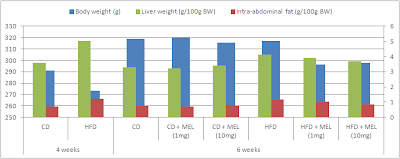Don't let your brain shrivel away!
Published in the December issue of Neurobiology of Aging is a paper that investigated the effects of six months of high dose (10mg/kg) melatonin supplementation and/or exercise on six-month-old 3xTg-AD mice. Due to their specific genetic make-up, these mice are prone, or rather destined to develop Alzheimer's at a pretty young age. Based on previous research on the effects of exercise and the anti-oxidative properties of melatonin, the researchers speculated that if each of them could exert beneficial effects on the development of the Alzheimer's-inducing plaque in the brain of the mice, the combination of exercise + melatonin should be even more protective.
 |
| Figure 1: Amyloid- beta and phospho-tau in the cerebral cortex of nontransgenic mice (control) mice, 3xTg-AD (Tg) mice, and Tg mice treated with melatonin, physical exercise, and melatonin plus exercise (data adapted from Garcia-Mesa. 2011) |
 |
| Figure 3: Effects of different treatments on cerebral cortical redox status of 3xTg-AD (Tg) mice; * p < 0.05, *** p < 0.001 compared with healthy control; # p < 0.05, ## p < 0.01, ### p < 0.001 compared with Alzheimer's prone control; & p < 0.05, && p < 0.01 compared with melatonin alone; $ p < 0.05 compared with exercise alone (data calculated based on Garcia-Mesa. 2011). |
Six-month chronic treatments began at a moderate pathology phase, when animals already present cognitive loss and brain pathology. Overall, both melatonin and exercise groups showed a remarkable amelioration of cognitive and brain redox states up to NTg mouse levels. Differential neuroprotection was obtained against other alterations. Namely, behavioral and psychological symptoms of dementia were protected by exercise and senescence parameters by melatonin. Interestingly, the combined treatment induced neuroprotective effects against brain mitochondria deterioration.The last observation, that only the combination of both treatments could protect the mice against brain mitochondria deterioration is actually particularly interesting with regards to the concept of mitohormesis and the issue of "how much stress is too much stress", I have broached in a number of previous blogpost. If we took the results of the study at hand as a reference, the answer to this question would be as much exercise induced and thusly beneficial stress as your antioxidant system can handle ... and the capcity of the latter was obviously profoundly upregulated in response to the high dose melatonin supplement the mice received in their drinking water.
The treatment was yet not without (un-?)wanted side-effects
Now obviously almost no effective drug, or in this case a hormone, is without side-effects and you should thusly not be surprised that the 10mg/kg melatonin the mice consumed on a daily basis (this is a human equivalent of ~65g!) were not completely side-effect free.
 |
| Figure 3: Relative changes in body weight, white adipose tissue (%), brown adipose tissue (%) and thymus (%) vs. healthy control (data calculated based on Garcia-Mesa. 2011) |
- - 61% reduction in white adipose tissue mass,
- -9% in brown adipose tissue mass, and
- 16% less reduction in thymus mass
Melatonin as an ergogenic weight loss adjuvant?
If you have been following my blogposts for quite some time now, you will already be aware that melatonin is far more than your bodies natural sleeping pill. On June, 4, 2011 I discussed the results of an amazing study, where a funky melatonin-loading-protocol effectively reduced the profound increase of inflammatory markers following an ultra-endurance race (cf. "More Than Restorative Sleep in a Pill"). In a more recent paper that is going to be published in the January edition of the Journal of Pineal Research, Germaine Escames et al. speculate about another exercise-melatonin interaction, the effects of which could be much more pronounced than the potential ergogenic effects in the aforementioned study: The exercise induced depletion of inodole, which is used to combat the oxidative stress, and the subsequent depletion of melatonin could in fact have negative impacts on the circadian system of which we are just beginning to realize that it has profound effects on how we look, feel and perform (Escames. 2012), so that strategic supplementation with melatonin could eventually turn out to be of particular importance for the overall health, not just the performance of athletes.
 |
| Figure 4: Body weight (left axis) and liver and intra-abdominal fat weight (right axes) after 4 weeks on control or high fructose diet without melatonin and after two additional weeks with daily injection of 1mg/kg or 10mg/kg melatonin (data adapted from Kitagawa. 2012) |
In view of these recent studies, I am pretty sure that we are soon going to see more research - including human data - on the subject. And I guess that I don't have to tell you that the SuppVersity is where you will find the detailed analyses of the results of those trials first, do I ;-) ?











0 comments:
Post a Comment